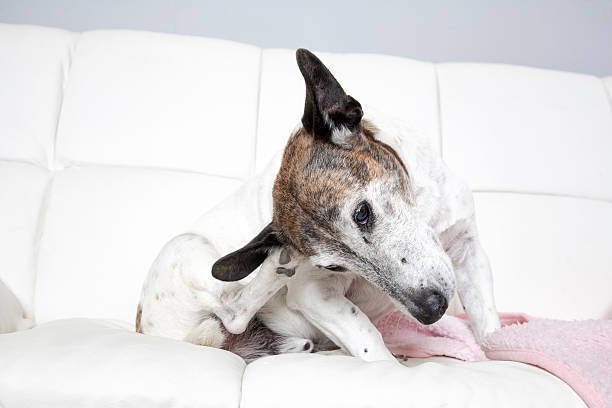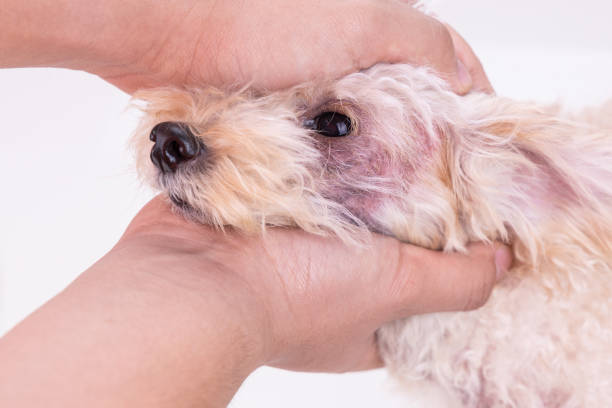Dogs can potentially catch colds from humans. However, the dynamics of this transmission are still not clearly understood. There’s a hypothesis that a virus responsible for causing a cold in humans could settle in a dog’s nose after passing through a human’s mouth. Nevertheless, currently, there’s no definitive evidence supporting this assumption.
The answer to this question may surprise you–dogs can get human colds, but no one is sure how they do it. Research suggests that the virus that causes human colds may be able to take root in a dog’s nose after it has gone through someone’s mouth, but for now, there is no definite answer.
How to Prevent and Treat a Dog’s Cold
In the meantime, what you can do to protect your dog from catching a human cold is to keep their living environment as clean as possible and avoid exposing them to crowded places with people who are sick. If your dog does contract a human cold, or any other kind of respiratory infection for that matter, make sure to contact your vet before giving them medication because some of them can’t be administered to dogs.
Cute and cuddly, dogs seem like they were made for people’s laps and playtime. But there is one thing you should remember: no matter how lovable they are, dogs can get sick just like humans can. With all the recent concern over bird flu in Asia, some dog owners may wonder if their best furry friend can catch that virus and, more importantly, if they could pass it to other humans.
What you want to do first and foremost is clean up any messes that could be harbouring bacteria and viruses responsible for respiratory infection in both humans and dogs, such as around the house or outside where they go to the bathroom. And always try not to overexpose them when sick since they may need one sneeze or cough for that virus to make its way into their coat of fur.
Remember: Viruses cannot pass through a healthy person’s system at all. So, wash your hands before touching your dog, especially after touching those feeling under the weather.
If your dog does come down with a respiratory infection such as kennel cough, veterinarians will often prescribe antibiotics to treat it. But they may not want to give these drugs if your pet is pregnant or has other severe ailments because of their lack of experience with treating those conditions in dogs.


Treatments for a dog’s cold are generally to help reduce the symptoms and manage the underlying cause. Typically a vet will recommend a combination of things, including rest, fluids, antibiotics if warranted, comforting care such as petting and stroking the animal, and reducing stress in their life overall. If there is no improvement in four days with home treatment or you see an increase in severity of symptoms, call your veterinarian.
However, keep in mind that dogs heal faster than humans, so they may not need as much time for their colds to recover.
Dogs are probably the most common pet animal on Earth and have been domesticated by humans for thousands of years. This close relationship with people means that dogs are occasionally exposed to human diseases, just like getting colds from them. However, until recently, researchers were not sure how dogs contracted human colds.
During the past few years, scientists have discovered evidence suggesting dogs can contract human cold viruses directly through their respiratory tracts after being put in the mouth of a person sneezing or coughing with secretions containing virus particles. However, scientists are not yet sure how this happens.
Once the cold virus gets into a dog’s mouth, it is probably no problem to infect them with its cold-causing abilities. Dogs’ noses and mouths have mucous membranes similar to those of humans that make their respiratory tracts easy targets of viruses like influenza or parainfluenza.


However, unlike us, dogs do not present any human cold symptoms- they remain carriers of the virus until they are either killed by it or die themselves due to some other health condition. Some vets believe that dogs’ immune systems can fight off cold viruses more efficiently than humans’.
Still, this does not mean that dogs are immune from the dangers of human colds. Remember, a dog can still pass these viruses to you through their saliva on your hands or any other surface they touch after they have been exposed. And while some dogs may be better at fighting off a cold than others, this ability is not universal, and every dog has the same susceptibility to human colds held by every other dog.


Conclusion
If you’re a dog owner, it’s essential to know that your pet can get human colds too. Dogs may be infected with the virus through contact with someone sneezing or coughing in their presence, but there are no conclusive answers as to how this happens.
Once the dog gets sick from its exposure to humans, it will not show any symptoms of having a cold themselves-they’ll carry around the virus until either dying due to another health condition or being killed by it. If you have both dogs and people in your household, take steps now so that all members of your family stay healthy.
As with humans, there is no cure for dog colds, but the animal should be made as comfortable as possible until their immune systems can overcome the condition. Dogs will usually recover from a cold within a week, depending on how severe it was and whether they have other health conditions to worry about. However, if you notice your dog has trouble breathing or seems uncomfortable in any way, call your veterinarian immediately.


